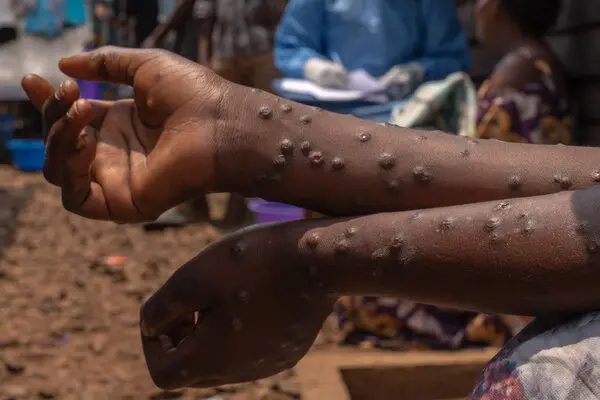The Ghana Health Service (GHS) has reported a concerning rise in Mpox cases, with 27 new infections confirmed as of September 1, 2025, bringing the national total to 494. This recent surge follows a trend of increasing cases observed over the preceding days. On August 28th, 21 new cases were identified, elevating the total to 467. Just three days prior, on August 25th, another 22 cases were recorded, bringing the count to 446. This upward trend underscores the ongoing transmission of the virus within the population and necessitates heightened public awareness and proactive preventive measures. Currently, only one patient remains under treatment, indicating a potential for recovery, though further monitoring and analysis are crucial to assess the overall impact of the outbreak.
This escalating pattern of Mpox infections in Ghana poses a significant challenge to the public health system and necessitates a comprehensive response. The continuous increase in cases necessitates a thorough epidemiological investigation to identify the key drivers of transmission. This could involve contact tracing, studying transmission patterns within specific communities or regions, and analyzing potential risk factors associated with the spread. Understanding these factors is crucial for developing targeted interventions and effectively curbing the spread of the virus. Simultaneously, strengthening public health messaging is paramount. Clear and accessible information regarding symptoms, prevention, and treatment should be disseminated widely to empower individuals to protect themselves and their communities.
Mpox, also known as monkeypox, is a zoonotic disease, meaning it can be transmitted from animals to humans. It is caused by the Mpox virus, a member of the Orthopoxvirus genus in the family Poxviridae. The primary mode of Mpox transmission is through direct contact with an infected individual, animal, or contaminated materials such as bedding or clothing. Specifically, contact with lesions, body fluids, respiratory droplets, or contaminated surfaces can facilitate the spread of the virus. While less common, transmission can also occur through respiratory droplets during prolonged face-to-face contact.
The clinical presentation of Mpox typically begins with a prodromal phase characterized by non-specific symptoms including fever, headache, muscle aches, back pain, swollen lymph nodes (lymphadenopathy), chills, and exhaustion. This initial phase can last for one to five days, followed by the development of a characteristic rash. The rash typically progresses through various stages, beginning as macules (flat discolored spots), evolving into papules (raised bumps), vesicles (fluid-filled blisters), pustules (pus-filled blisters), and finally scabs. The rash can appear on any part of the body, including the face, palms of the hands, soles of the feet, oral mucous membranes, genitalia, and conjunctiva.
The Ghana Health Service’s proactive response to the Mpox outbreak is critical to containing the spread and mitigating its impact. Public health messaging emphasizes the importance of vigilance, adherence to strict hygiene practices, and prompt medical attention upon noticing any Mpox symptoms. These recommendations are crucial for early detection, isolation of infected individuals, and prevention of further transmission. In addition to public awareness campaigns, health authorities should prioritize contact tracing efforts to identify and monitor individuals who may have been exposed to the virus.
The current situation necessitates a multi-pronged approach to address the Mpox outbreak effectively. This includes robust surveillance systems to monitor the spread of the virus, enhanced laboratory capacity for accurate diagnosis, and readily available medical care for infected individuals. Furthermore, public health education campaigns should be intensified to disseminate accurate information and dispel misinformation about the disease. Community engagement plays a crucial role in promoting preventative measures and encouraging individuals to seek timely medical attention. International collaboration and resource mobilization are essential to support the Ghana Health Service’s efforts in combating the outbreak and protecting public health. As the situation evolves, continuous monitoring and adaptive strategies are vital to effectively manage the Mpox outbreak and minimize its impact on the population.














